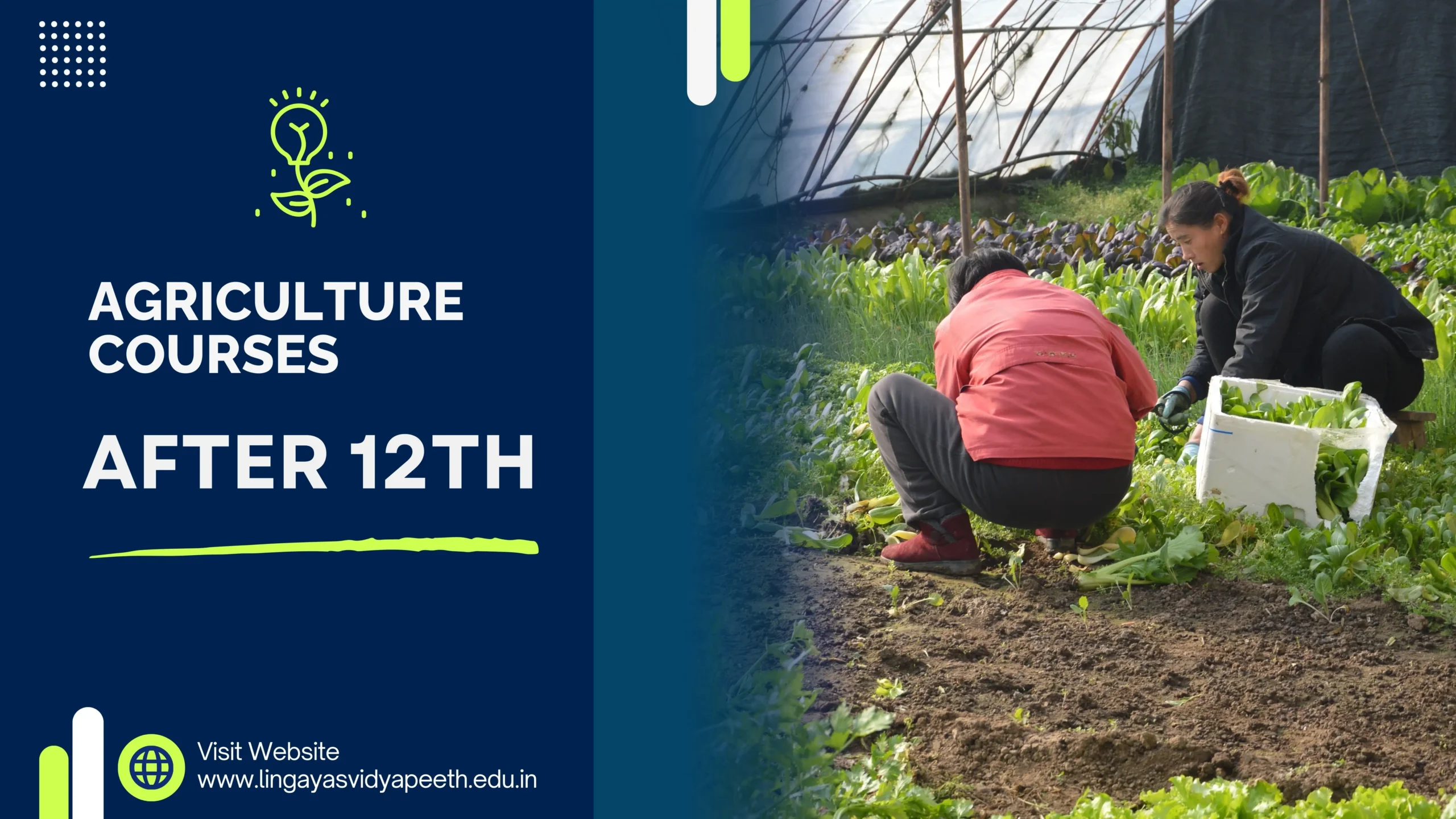Home » Agriculture Courses After 12th: Know the Eligibility

Whether you’re inspired by nature, intrigued by science, or committed to making a positive difference, agriculture courses after 12th is a smart career option. I’m part of Lingaya’s Vidyapeeth University, and our B.Sc. (Hons.) Agriculture program help students like you dive into a field that’s both rewarding and growing fast.
Agriculture isn’t just about planting seeds; it’s about using science to feed the world and protect the planet. By 2030, the global agriculture industry could hit $5.3 trillion, opening tons of jobs for trained experts according to the Statista.
Let me walk you through everything you need to know about agriculture courses after 12th. Along the way, I’ll also share why Lingaya’s is a great place to begin your journey.
Agriculture keeps the world running—it gives us food, clothes, and even fuel. It mixes hands-on work with cool tech, like using drones to check crops or apps to test soil. At Lingaya’s Vidyapeeth, our B.Sc. (Hons.) Agriculture students get to try these tools in real fields, learning how to grow more food sustainably.
Plus, the job options are endless. You could become a farm manager, a scientist studying new crops, or even start your own agribusiness. In India, fresh graduates earn ₹3-8 lakhs a year, and by 2030, the need for agriculture pros is expected to jump 10% because of eco-friendly farming trends.
Choosing agriculture courses after 12th means you’re set for a career that matters and pays well.
Students frequently inquire about the admission process for agriculture courses after 12th. Here’s what you need to know.
Know the Requirements: Most programs, like our B.Sc. (Hons.) Agriculture, ask for a science stream in 12th (think Physics, Chemistry, Biology, or Math) with at least 50% marks. At Lingaya’s, we make sure the process is clear and fair.
Another question I hear a lot is, “What is the duration of agriculture courses after 12th?” It depends on what you choose:
At Lingaya’s, our B.Sc. students spend their final year working with real farmers through the Rural Agricultural Work Experience (RAWE) program. For example, one of our students helped a local farmer switch to drip irrigation, saving water and boosting crops.
If you’re an arts student, you might think agriculture isn’t for you. Good news—you’ve got options! While degrees like B.Sc. (Hons.) Agriculture need a science background, arts students can jump into these agriculture courses after 12th:
Here’s a quick look at some awesome agriculture courses after 12th:
Our B.Sc. (Hons.) Agriculture students visit nearby farms to study bugs and diseases, which helps them solve real problems. That’s why our program, built on ICAR standards, gets graduates hired fast.
At Lingaya’s Vidyapeeth, our School of Agriculture isn’t just about classes—it’s about building your future. We keep things practical and connected to what the industry needs. Here’s why students pick us:
One of our students recently figured out a cheap way to make compost during their RAWE project, and now local farmers use it. That’s the kind of impact we help you make at Lingaya’s, without any hype.
Agriculture courses after 12th lead to all kinds of careers. Here’s what you could do and what’s coming by 2030:
Our placement team at Lingaya’s helps students meet top companies, so you’re not just studying—you’re starting a career.
Turn your passion for nature and innovation into a meaningful career with agriculture courses after 12th. Whether you’re a science student ready for B.Sc. (Hons.) Agriculture or an arts student eyeing a diploma, there’s a path for you. At Lingaya’s Vidyapeeth, we give you the skills, tools, and support to succeed in a field that’s set to boom by 2030. Ready to grow your future? Check out our B.Sc. (Hons.) Agriculture at Lingaya’s Vidyapeeth and apply today to make a difference.
Also Read
BSc courses after 12th
Best engineering courses after 12th
High salary courses after 12th Arts stream
Biotechnology courses after 12th
High salary courses after 12th Humanities
Best course after 12 Commerce
From
Lingaya’s Vidyapeeth
Best College in Faridabad
RECENT POSTS
CATEGORIES
TAGS
Agriculture Agriculture future AI Architecture artificial intelligence BA English BA Psychology BTech CSE BTech Engineering Business management career Career-Specific Education career guide Career Opportunities career option career scope Civil engineering commerce and management Computer Science Computer science engineering Data science degree education Engineering Engineering students English Literature english program Exam tips Fashion Design Fashion design course Higher Education Journalism journalism and mass communication law Law career Machine Learning MA Psychology Master degree mathematics MBA Mechanical Engineering Pharmacy Psychology Research and Development students
University Address: Nachauli, Jasana Road, Faridabad, Haryana
Toll Free: 1800-120-4613
Mobile : 8447744303 | 8447744304 | 8447744306 | 8447744309
Address: C-72, Second Floor, Shivalik, Near Malviya Nagar,
Above HDFC Bank, New Delhi 110017
Ph.No. - 011-46570515 / 45138169 / 41755703 / +91-7303152412
Jagmani Kutir, Ground Floor, Road No-1, Rajeev Nagar,
Near Darbar Marriage Hall, Patna-800024, Bihar
Contact No: 9818352069/8130120095
Mail: [email protected]
Copyrights © 1998 - 2025 Lingaya's Vidyapeeth (Deemed To Be University). All rights reserved.
It is important to note that the following email IDs and domains are fraudulent and do not belong to our university.
LV only conducts physical/online verification of any document related to examination on the following email id: